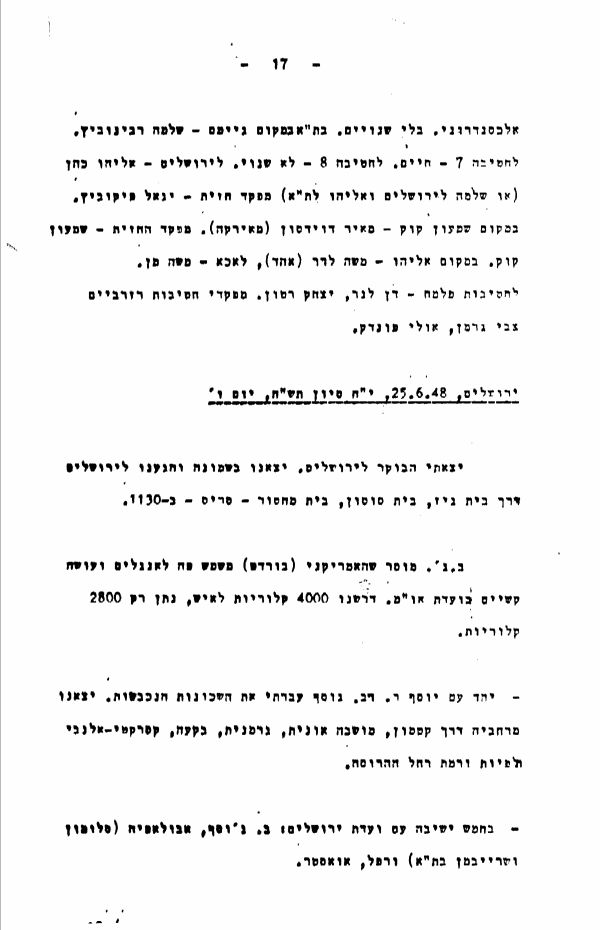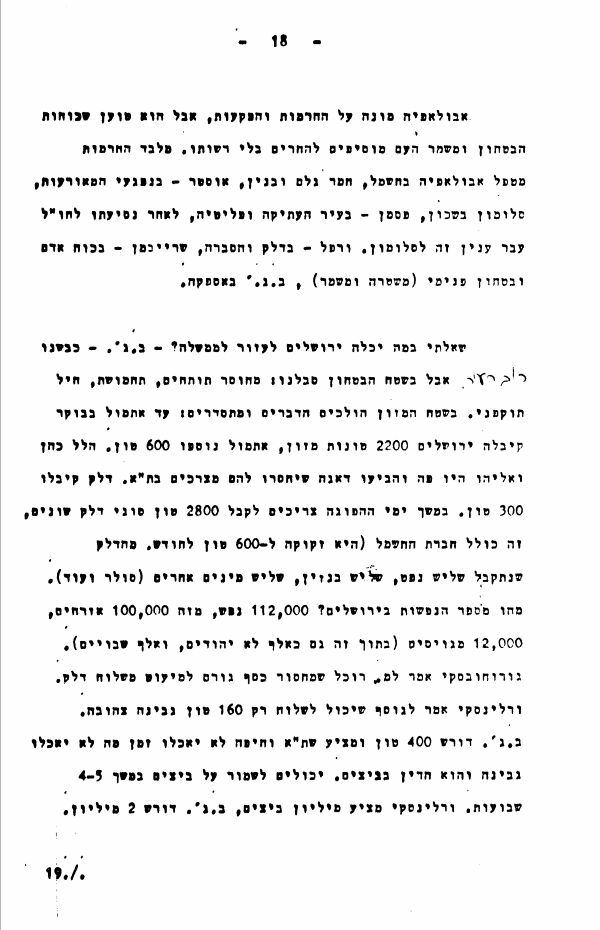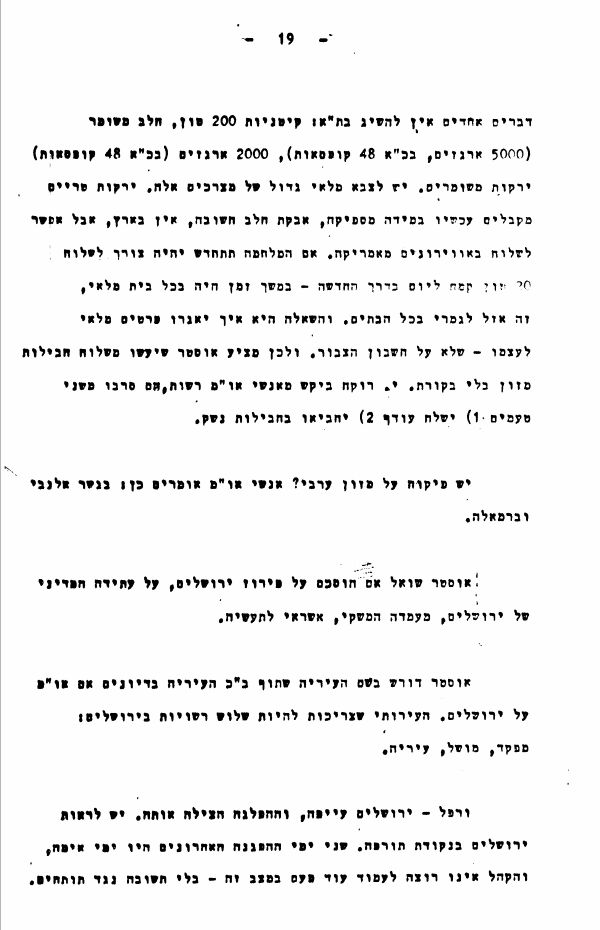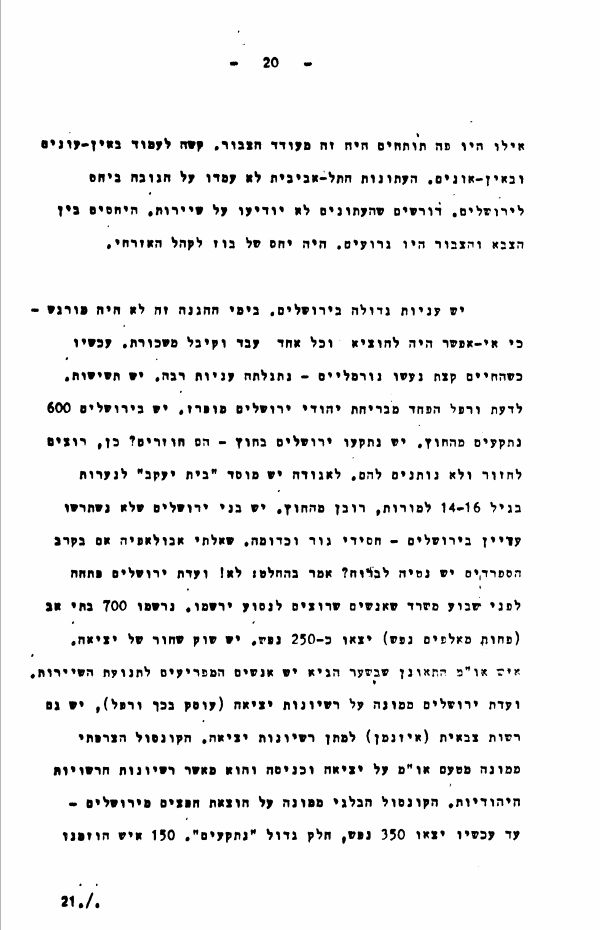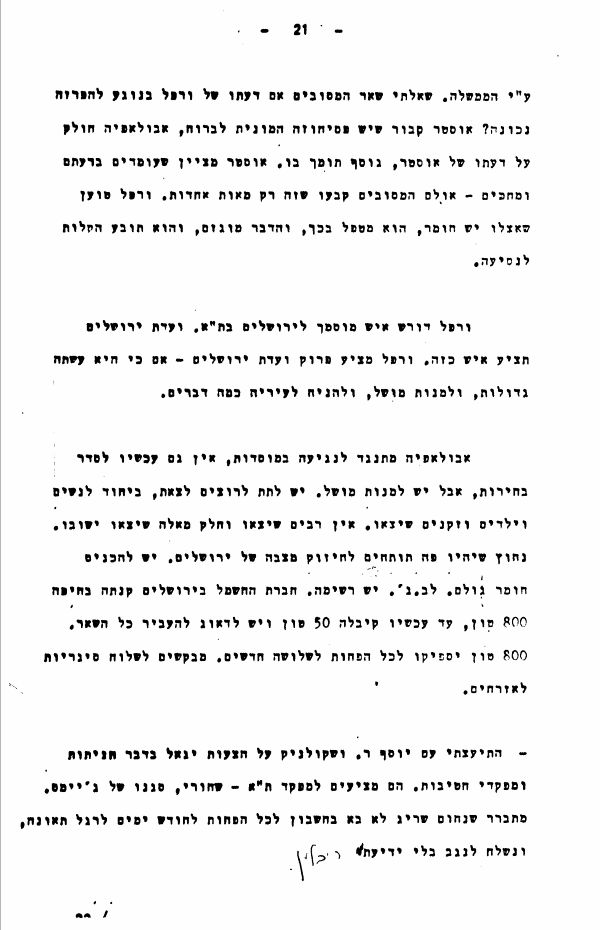1
of
Places:
Jerusalem
Burma
Beit Susin
Saris
Goren
Haifa
The use of the photograph is subject to the Copyright Law, 2007
24.06.1948
225403
Friday, June 25, 1948, Jerusalem I set out for Jerusalem this morning. We left at eight and reached Jerusalem [via the “Burma Road”] by way of Beit-Jiz, Beit Susin, Beit Mahsir – Saris – at 11:30. – B. J. [Bernard Joseph, Dov Yosef] reports that the American [Vice Consul in Jerusalem] (Burdett) serves as a mouthpiece for the English and is making problems in the UN [Palestine] Commission. We demanded 4,000 calories per person. He only granted 2,800 calories. Along with Yosef R. [Avidar] and B. Joseph I went through the captured neighborhoods. We exited Rehavia through Katamon, the Greek Colony, the German [Colony], Baq’a, Allenby military camp, Talpiot, and Ramat Rahel, which has been destroyed. At five a meeting with the Jerusalem Committee: B. Josefph, [David] Abulafia, ([Haim] Salomon and [Reuven] Shraibman [Shari] in Tel Aviv), [Yitzhak] Werfel [Raphael], and [Daniel] Auster. Abulafia was put in charge of confiscations and expropriations. But he claims that the security forces and People’s Guard continue to confiscate without their authority. Aside from confiscations, Abulafia handles electricity, raw materials, and construction; Auster – victims of the riots; Salomon – housing. [Charles] Passman – the Old City and its refugees. After he left to go abroad, this issue was turned over to Salomon; Werfel – fuel and hasbara [explanation, public relations]; Shraibman – manpower and internal security (police and [People’s] Guard), B. J. [Dov Yosef] – supplies. I asked: In what way can Jerusalem help the government? B. J. [Dov Yosef]: We’ve conquered most of the city. But we suffered in terms of defense: for lack of cannons, ammunition, offensive forces. In terms of food things are gradually getting sorted out: as of yesterday morning Jerusalem received 2,200 tons of food. Yesterday another 600 tons were added. Hillel Cohen and [Moshe] Yulish [of Solel Boneh] were here and expressed concern that they would not have enough goods [to purchase, due to shortages] in Tel Aviv. They received 300 tons of fuel. During the days of the truce they’re supposed to receive 2,800 tons of different types of fuel. This includes the Electric Company (which needs 600 tons per month[)]. Of the fuel received, a third is kerosene, a third is gasoline, a third is other types (diesel, etc.). How many people are there in Jerusalem? 112,000 people. Of this, 100,000 are civilians, 12,000 are conscripts (including about a thousand non-Jews, and a thousand prisoners). [Shraga] Gorochowsky [Goren] told Y. Rochel [Avidar] that lack of money results in less fuel delivery. Warlinski told Joseph that he can only send 160 tons of yellow cheese. B. Joseph demands 400 tons, and suggests that Tel Aviv and Haifa not eat cheese for a while, and the same with eggs. Eggs can be kept for 4-5 weeks. Warlinski suggests a million eggs. B. J. demands 2 million. Other things [being demanded for Jerusalem] cannot be obtained in Tel Aviv [either]: legumes, 200 tons. Condensed milk (5,000 crates, 48 cans in each), 2,000 crates of canned vegetables (48 cans in each), but the army has large stocks of these goods. Fresh vegetables are arriving in sufficient quantities now. Powdered milk is important. There’s none in the country. But it can be sent by planes from America. If the fighting resumes it will be necessary to send 20 tons of flour per day [to Jerusalem] via the new road [the Burma Road]. For a while each home had reserves. These were completely depleted in all homes, and the question is how private [individuals] can assemble reserves for themselves – not at the public expense? Towards this end D. Auster proposes that food packages be delivered without oversight. [Tel Aviv mayor] I. Rokach asked the UN personnel for permission. They refused for two reasons: 1) a surplus would be sent; 2) weapons would be hidden in the packages. Is Arab food subject to oversight? – The UN personnel say: Yes, at Allenby Bridge, and in Ramallah. Auster asks if an agreement has been reached on the demilitarization of Jerusalem, on Jerusalem’s political future, its economic status, credit for industry. On behalf of the municipality Auster demands that a municipal representative be included in UN talks on Jerusalem. I commented that there should be three authorities in Jerusalem: command, governor, municipality. Werfel [Yitzhak Raphael]: Jerusalem is tired, and the truce saved it. Jerusalem should be viewed as a point of vulnerability. The last two days of shelling were days of terror, and the public doesn’t want to be placed in this situation again – with no response to cannons. If there were cannons here, it would bolster the public. It’s hard to remain unresponsive and powerless. The Tel Aviv press was not up to par regarding Jerusalem. They insist that the newspapers not report on convoys. Relations between the army and the public were terrible. There was an attitude of contempt towards the civilian public. There’s tremendous poverty in Jerusalem. During the days of the shelling it wasn’t felt – because it wasn’t possible to spend [money], and everyone worked and received a salary. Now that life has become slightly normal – a lot of poverty has come to light. There’s exhaustion. In Werfel’s view the fear of Jerusalem Jews fleeing is exaggerated. In Jerusalem there are 600 trapped outsiders. There are [people] trapped in Jerusalem [from] outside – Are they returning? – Yes, they want to return and aren’t being allowed. The Aguda [Agudas Israel] has an institute for teachers, Bet Ya’akov, for girls aged 14-16, mostly from outside. There are some in Jerusalem who haven’t yet formed roots in the city – Gur Hasidim and the like. I asked Abulafia whether there is an inclination to flee among the Sephardim. He stated absolutely: No! A week ago the Jerusalem Committee opened an office, to register people who want to leave. 700 households (fewer than 2,000 people) registered. About 250 people left. There is a “black market” for leaving. A UN representative complained that there are people at Sha’ar HaGai disrupting the passage of convoys. The Jerusalem Committee is in charge of exit permits (Werfel handles this). There’s also a military authority ([Shmuel] Eisenmann) for granting exit permits. The French consul is in charge of entry and exit on behalf of the UN, and he approves the permits of the Jewish authorities. The Belgian consul is in charge of the removal of possessions from Jerusalem. So far 350 people have left. A large portion [of them are among those who were] “trapped.” 150 people have been summoned by the government [for positions outside of Jerusalem]. I asked the rest of those assembled whether Werfel’s opinion on exaggerations [i.e., that the scope of departure from Jerusalem is being overstated] is accurate. Auster believes that there’s a mass psychosis to flee. Abulafia disputes Auster’s opinion. Joseph supports it. Auster notes that people are standing in line and waiting – but the [others] said that it’s only a few hundred. Werfel claims that he has material. He’s handling it, and the matter is being exaggerated, and he’s calling for [the restrictions on] travel to be eased. Werfel demands an authorized person from Jerusalem in Tel Aviv. The Jerusalem Committee will propose such a person. Werfel proposes that the Jerusalem Committee be disbanded – although it has done great work – and that a governor be appointed, and that the municipality be granted a few things. Abulafia opposes undermining the institutions. Nor should elections be held now, but rather a governor should be appointed. Those who want should be about to leave, especially women and children and the elderly. Not many have left, and some of those who left – will return. It’s necessary to have cannons here. In order to strengthen Jerusalem, raw material has to be brought in. B. J. [Dov Yosef]: There’s a list [of raw material]. The Electric Company in Jerusalem bought 800 tons [of fuel] in Haifa. So far it’s received 50 tons, and we need to make sure that the rest is transferred. 800 tons will suffice for at least three months. They’re asking for cigarettes to be sent for civilians. – I consulted with Yosef R. [Avidar] and Shkolnik [Eshkol] regarding Yigael [Yadin]’s proposals for fronts and battalion commanders. For Tel Aviv commander they propose [Yisrael] Shchori, deputy to James [Ben-Gal]. Turns out that Nahum Sarig is not an option for at least a month because of an accident, and he was sent [back] to the Negev without knowledge of his limitations. It seems to me that Eliahu [Ben-Hur] is suited to this position. – In the evening I received a message from the Operations Department, which was dispatched at 6:15 p.m. from Tel Aviv: the Egyptians violated the truce and attacked Kefar Warburg and Be’er Tuvia with [heavy] machine gun fire from low-flying airplanes. In addition a UN aircraft was damaged by two Egyptian Spitfire airplanes and had to make a forced landing. Our men rushed to their aid and came under fierce attack. One soldier was injured. The convoy that was supposed to go to the Negev under the UN resolution was prevented from transiting by Egyptian forces. The convoy returned to its base. Bonde, Bernadotte’s chief of staff, declared in writing that the Egyptians had violated the truce and the Jews are free to respond. The village of Birwa [today Ahihud] was recaptured by our forces. The enemy had a number of losses, including 50 killed. Three armored vehicles (whose?) were rendered inoperable. 2 cannons and 3” mortars (whose?) were destroyed. Our losses entailed 24 wounded. The Foreign Minister announced before reporters that in light of the riots our forces would be mobilized as needed, where and when deemed necessary. – Nehemiah [Argov] reports that as of tomorrow morning a plane will be available for me at the airfield in Jerusalem [to return to Tel Aviv].





